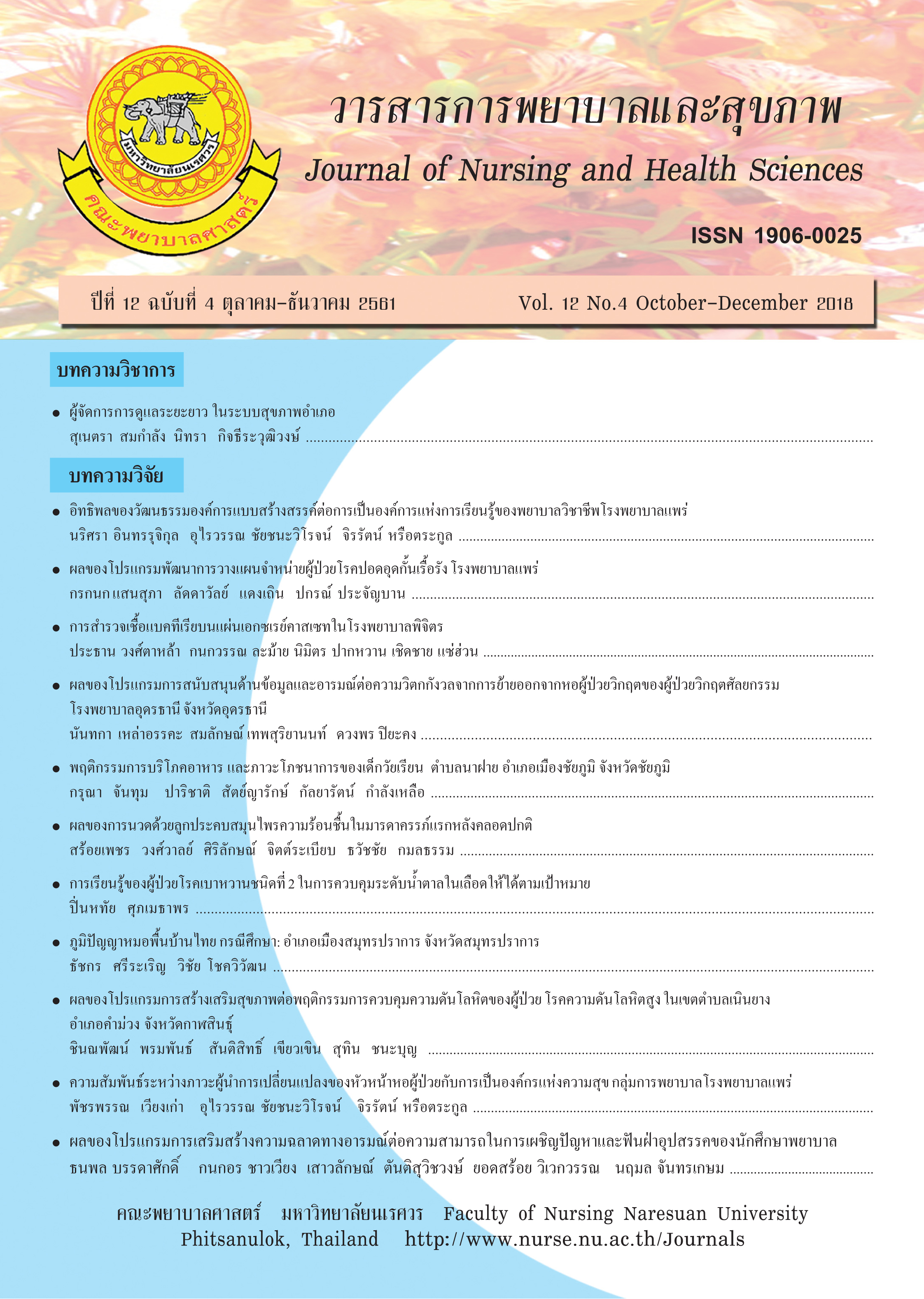ผลของโปรแกรมการเสริมสร้างความฉลาดทางอารมณ์ ต่อความสามารถในการเผชิญปัญหาและฟันฝ่าอุปสรรคของนักศึกษาพยาบาล
Main Article Content
บทคัดย่อ
การวิจัยแบบกึ่งทดลองนี้ มีวัตถุประสงค์เพื่อศึกษาผลของโปรแกรมการเสริมสร้างความฉลาด ทางอารมณ์ต่อความสามารถในการเผชิญปัญหาและฟันฝ่าอุปสรรคของนักศึกษาพยาบาล กลุ่มตัวอย่างเป็น นักศึกษาพยาบาลศาสตรบัณฑิตชั้นปีที่ 1 วิทยาลัยพยาบาลบรมราชชนนี พระพุทธบาท ที่มีคุณสมบัติตาม เกณฑ์ที่กำหนดจำนวน 36 คน สุ่มกลุ่มตัวอย่างเข้ากลุ่มทดลองและกลุ่มควบคุม กลุ่มละ 18 คน กลุ่มทดลอง ได้รับโปรแกรมการเสริมสร้างความฉลาดทางอารมณ์จำนวน 8 ครั้ง สัปดาห์ละ 2 ครั้ง ครั้งละ 60-90 นาที ส่วนกลุ่มควบคุมได้รับการดูแลตามปกติ เครื่องมือที่ใช้ในการเก็บรวบรวมข้อมูลประกอบด้วยข้อมูล ส่วนบุคคลและแบบสอบถามความสามารถในการเผชิญปัญหาและฟันฝ่าอุปสรรค วิเคราะห์ข้อมูลก่อนการ ทดลอง หลังการทดลองเสร็จสิ้นทันที และติดตามผล 1 เดือน โดยใช้สถิติเชิงพรรณา สถิติการทดสอบค่าที และการวิเคราะห์การแปรปรวนแบบวัดซ้ำ และทดสอบความแตกต่างรายคู่ด้วยวิธีบอนเฟอร์โรนี ผลการวิจัยพบว่า 1. กลุ่มทดลองมีคะแนนเฉลี่ยความสามารถในการเผชิญปัญหาและฟันฝ่าอุปสรรคสูงกว่ากลุ่มควบคุม อย่างมีนัยสำคัญทางสถิติที่ระดับ .001 ทั้งในระยะหลังการทดลองเสร็จสิ้นทันทีและระยะระยะติดตามผล 1 เดือน 2. กลุ่มทดลอง มีคะแนนเฉลี่ยความสามารถในการเผชิญปัญหาและฟันฝ่าอุปสรรคในระยะก่อน การทดลอง ระยะหลังการทดลองเสร็จสิ้นทันที และระยะติดตามผล 1 เดือน แตกต่างกันอย่างมีนัยสำคัญ ทางสถิติที่ระดับ .001
Article Details
เอกสารอ้างอิง
กัญพัฒนพร, ชัญญา แสงจันทร์ และพวงเพชร
เกษรสมุทร. (2558). ความสัมพันธ์ระหว่าง
ความฉลาดทางอารมณ์กับพฤติกรรมการปรับตัว
ของนักศึกษาพยาบาล. วารสารพยาบาลศาสตร์,
33(1), 55-65.
กมลรัตน์ ทองสว่าง. (2560). ความสัมพันธ์ระหว่าง
ปัจจัยส่วนบุคคล ความเครียด ความฉลาด
ทางอารมณ์กับผลสัมฤทธิ์ทางการเรียนของ
นักศึกษาคณะพยาบาลศาสตร์ มหาวิทยาลัย
ราชภัฏชัยภูมิ. วารสารพยาบาลทหารบก, 18(2),
91-100.
กรมสุขภาพจิต. (2550). อีคิว: ความฉลาดทางอารมณ์
(ฉบับปรับปรุง). พิมพ์ครั้งที่ 4. นนทบุรี: สำนัก
พัฒนาสุขภาพจิต.
ชนัดดา เพ็ชรประยูร, ชูศรี เลิศรัตน์เดชากุล และนนทิรัตน์
พัฒนภักดี. (2554) ความสามารถในการปรับตัว
ของนักศึกษาชั้นปีที่ 1 ในมหาวิทยาลัยของรัฐ.
วารสารวิชาการพระจอมเกล้าพระนครเหนือ,
21(1), 157-166.
ทศพร บรรจง. (2555). ปัจจัยที่ส่งผลต่อความสามารถ
ในการเผชิญปัญหาและฟันฝ่าอุปสรรคของ
นักเรียนมัธยมศึกษาปีที่ 4. วารสารวิชาการ
มหาวิทยาลัยอีสเทิร์นเอเชีย ฉบับสังคมศาสตร์
และมนุษยศาสตร์, 2(2), 209-220.
นิดา แซ่ตั้ง. (2555). ความฉลาดทางอารมณ์ในการ
เผชิญอุปสรรคที่มีผลต่อการทำงานของ
พนักงานธนาคารไทยพาณิชย์ในกรุงเทพ
มหานคร. วิทยานิพนธ์ บธ.ม., มหาวิทยาลัย
ศรีนครินทรวิโรฒ, กรุงเทพฯ.
นุชนาถ แก้วมาตร, จันทนา เกิดบางแขม และ
ชนัดดา แนบเกษร. (2554). ปัจจัยที่มีอิทธิพล
ต่อภาวะซึมเศร้าของนิสิตพยาบาล. วารสาร
คณะ พยาบาลศาสตร์มหาวิทยาลัยบูรพา,
ฉบับเพิ่มเติม 2(19), 83-95.
ปวิดา โพธิ์ทอง สุพัตรา พุ่มพวง และสุนทรี ขะชาตย์.
(2554). ความเครียด การปรับตัว และความฉลาด
ทางอารมณ์ของ นักศึกษาพยาบาลชั้นปีที่ 1
วิทยาลัยพยาบาลบรมราชชนนีสุพรรณบุรี.
วารสารวิทยาลัยพยาบาลพระปกเกล้า จันทบุรี,
22(2), 1-14.
ปราณี อ่อนศรี และสายสมร เฉลยกิตติ. (2556).
การจัดการเรียนรู้ทางการพยาบาลเพื่อสร้าง
ความสุข:บทบาทของผู้สอนและผู้เรียน. วารสาร
พยาบาลทหารบก, 14(1), 8-16.
ผุสนีย์ แก้วมณีย์ และเรวัตร คงผาสุข. (2557).
ความฉลาดทางอารมณ์ และการปรับตัวของ
นักศึกษาพยาบาลวิทยาลัยพยาบาลบรมราชชนนี
ยะลา. วารสารอัล-ฮิกมะฮฺ มหาวิทยาลัยฟาฏอนี
ฉบับสังคมศาสตร์และมนุษยศาสตร์, 4(8),
51-61.
วิทยาลัยพยาบาลบรมราชชนนี พระพุทธบาท. (2560).
รายงานผลการดำเนินงาน (มคอ.7) หลักสูตร
พยาบาลศาสตรบัณฑิต (หลักสูตรปรับปรุง
พ.ศ. 2555) [เอกสารอัดสำเนา]. สระบุรี:
วิทยาลัยฯ.
สมจินดา ชมพูนุท และวรรณเพ็ญ อินทร์แก้ว. (2555).
พลังสุขภาพจิต ความฉลาดทางอารมณ์ และ
ความเครียดของนักศึกษาพยาบาล วิทยาลัย
สภากาชาดไทย. วารสารการพยาบาลจิตเวช
และสุขภาพจิต, 26(2), 87-98.
สุธิดา พลชำนิ. (2555). การเสริมสร้างความสามารถ
ในการเผชิญอุปสรรคของนิสิตนักศึกษาไทย.
วิทยานิพนธ์ ค.ด., จุฬาลงกรณ์มหาวิทยาลัย,
กรุงเทพฯ.
เสาวลักษณ์ ศรีโพธิ์. (2561). ผลของโปรแกรมเสริม
สร้างความฉลาดทางอารมณ์ต่อภาวะสุขภาพ
จิตของนักศึกษาพยาบาล. วิทยานิพนธ์ พย.ม.,
มหาวิทยาลัยบูรพา, ชลบุรี.
อสมา มาตยาบุญ. (2549). การใช้กิจกรรมกลุ่มเพื่อ
เสริมสร้างความสามารถในการเผชิญปัญหา
และฟันฝ่า อุปสรรคของนักเรียนชั้นมัธยมศึกษา
ปีที่ 4 โรงเรียนเรยีนาเชลีวิทยาลัย. วิทยานิพนธ์
กศ.ม., มหาวิทยาลัยเชียงใหม่, เชียงใหม่.
อารีย์ ขันติธรรมกุล. (2558). ความสามารถในการ
เผชิญปัญหาและฝ่าฟันอุปสรรคของนักศึกษา
มหาวิทยาลัยศรีปทุม วิทยาเขตชลบุรี ตามทฤษฎี
ของสตอลทซ์. วารสารวิชาการศรีปทุมชลบุรี,
11(3), 49-55.
Burns, N., & Grove, S. K. (2005). The practice of
nursing research: Conduct, critique, and
utilization (5th ed.). Missouri: Elsevier Saunders.
Stoltz, P.G. (1997). Adversity Quotient: Turning
Obstacles into Opportunities. New York:
John Wiley & Sons.
Verma, S. (2017). The relationship between emotional
intelligence and various psychological
quotients. Journal of Business and Management,
19(1), 14-18.
Watson, R., Gardiner, E., Hogston, R., Gibson,
H., Stimpson, A., Wrate, R., et al. (2008).
A longitudinal study of stress and psychological
distress in nurses and nursing students.
Journal of Clinical Nursing, 18(2), 270-278.
Woo, H.Y., & Song, J.H. (2015). The Factors Affecting
the Adversity Quotient of Nurse and
Office Workers. International Journal of Bio-Science
and Bio-Technology, 7(5), 1-10.


